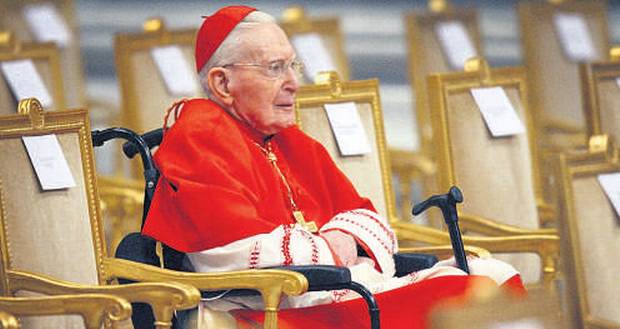The Vatican foreign minister’s lecture raised as many questions as it provided answers writes Martin O’Brien
It was a considerable coup for the organisers to secure as distinguished and high-powered a figure as the Vatican’s foreign minister to deliver the Cardinal Cahal B. Daly Centenary Memorial lecture in Queen’s University, Belfast at the weekend.
Archbishop Paul Gallagher, a Liverpudlian, Secretary for the Holy See’s Relations with States, to give him his proper title, in a 45-minute lecture running to 6,000 words, did a good job in reminding his audience of the rare qualities that made Cahal Daly an ecclesiastical colossus and one of the most significant figures in Irish public life in the second half of the last century.
He succeeded in relating the truly prophetic character of Daly, by drawing on some of his profound statements that will always stand the test of time.
It went down well with the audience which included Cardinal Seán Brady and Archbishop Eamon Martin, Daly’s two successors as archbishop of Armagh, Bishop Noel Treanor of Down and Connor and several prominent clergy from the Protestant community.
Questions
But I wondered if I was the only one in the audience who thought that the lecture may have left more questions than answers not just for the listeners but for, say, a future biographer of Cahal Daly, as I shall try to explain later.
In an address entitled ‘Go the extra mile: Cahal B. Daly Reflections on the practice of dialogue’ Archbishop Gallagher captured much of the wholeness of his subject’s life and its legacy even if there was as striking an omission as any reference to the cardinal’s 2004 book The Minding of Planet Earth which prefigured Pope Francis’ 2015 encyclical Laudato si (‘Praised Be You: On the Care of Our Common Home.)
That said, no lecturer however eminent could do justice to the breadth and depth of Cardinal Daly’s contribution as a philosopher, theologian, and moral leader over half a century in the time available.
Archbishop Gallagher is a very busy man on the international stage, holding one of the most important and politically-sensitive briefs in the Roman Curia.
He wouldn’t have the time to write a lecture such as this and the work would have been undertaken under his direction by a small team of officials in the Curia who relied particularly on two books by Daly, Steps on My Pilgrim Journey (1998) and The Price of Peace (1991).
Days before his address Archbishop Gallagher was in New York where he put aside diplomatic niceties to condemn Donald Trump for his inflammatory language towards North Korea Without naming him he said: “the threat or use of military force have no place in countering proliferation, and the threat or use of nuclear weapons in countering nuclear proliferation are deplorable.”
A few days later he was in the US State Department in Washington DC to meet Secretary of State Rex Tillerson to discuss Korea and very probably Trump’s plan to abandon the Iran nuclear arms deal.
This was Archbishop Gallagher’s first ever visit to Belfast, but alas he did not speak to the media which is a pity because I can think of lots of questions that The Irish Catholic could have put to him, beginning perhaps with whether his meeting with Secretary Tillerson was before or after Tillerson reportedly called Trump “a moron”, something the US Secretary of State has chosen not to publicly deny.
The audience, many of whom knew the late cardinal personally, and many more like Secretary Gallagher himself who did not, was told that Cahal Daly was a distinguished theologian who had been an advisor at the Second Vatican Council, neither an “intransigent” nor a “progressive” who admired the patient consensus seeking approach of Blessed Pope Paul VI.
We were told that he was a man of dialogue and committed to ecumenism and that he made an important contribution to the peace process.
All this may indeed be true although the cardinal’s contribution to the peace process could have been fleshed out.
Did his fierce and consistent condemnation of IRA violence and his powerful and reasoned critique of it help bring peace? Or was it his compelling prescription of the requirements of a political settlement? Or his forensic examination of counter-productive security policies by the British government? Or these and or other factors?
And how did Cahal Daly’s powerful espousal of dialogue, cited strongly by Archbishop Gallagher, square with his refusal to meet Gerry Adams, even after he was elected Sinn Féin MP for West Belfast?
What did he make of the Fr Alec Reid inspired Hume-Adams dialogue that he knew about and never publicly commented on?
Very appropriately, given Cahal Daly’s enduring commitment to ecumenism, there was a lovely ecumenical touch when former Presbyterian Moderator, Dr John Dunlop, an old friend of Cahal’s, and fellow-traveller in promoting deeper inter-Church relations was invited to reply to Archbishop Gallagher.
In thanking him for a stimulating talk Dr Dunlop enlivened the proceedings by joking that a political point was being made when he was offered a glass of orange juice during his speech.
Dr Dunlop paid a warm tribute to Daly remarking that the invitation to him to respond was “an indication of how things have changed on our inter-Church journey from the old days” which the late Irish-Rhodesian bishop Dr Donal Lamont, a native of Ballycastle, Co. Antrim, had once described as a state of “frozen misery.”
Interview
So, congratulations to Fr Eddie O’Donnell, the parish priest of St Brigid’s, Belfast and private secretary to Cahal Daly in his eight years as Bishop of Down and Connor; and to Judge Gemma Loughran, the late cardinal’s literary executrix, for having the idea to honour his memory in this way and organising such a successful event.
Fr O’Donnell, in a forthcoming interview for this newspaper, has told me that as far back as September 1, 1979 in London (a month before the arrival of the Pope in Ireland and five days after the assassination of Lord Mountbatten and the massacre at Warrenpoint) Dr Daly, still Bishop of Ardagh and Clonmacnois, gave a visionary address to the English Catholic Commission for International Justice and Peace entitled ‘Northern Ireland: From Impasse to Initiative’ in which he identified the requirements for a political settlement.
Daly said there had to be a total cessation of violence; new political institutions; security policies had to subordinated to and at the service of clearly defined political aims and new political thinking was required.
The peace process delivered on this but the political institutions of the Good Friday Agreement remain closed down and the jury is out on whether Northern Ireland as a polity can ever be made to work.
Deadlock
Secretary Gallagher’s speech may have been enhanced and would have attracted greater media attention had he used the opportunity, as Vatican foreign minister, to address the current political deadlock at Stormont using the type of prophetic language Cahal Daly himself used on numerous occasions, not least in his New Year World Peace Day addresses – there was a particularly memorable one in 1978 when he warned about the dangers of a political vacuum.
As someone who had the privilege of meeting the late cardinal on many occasions, several times at length in private, and experiencing his great personal kindness, without being able to say I really knew him, (I am not sure many, if any, really did) it was a joy to be present to celebrate his memory just five days after what would have been his 100th birthday.


 Martin O'Brien
Martin O'Brien